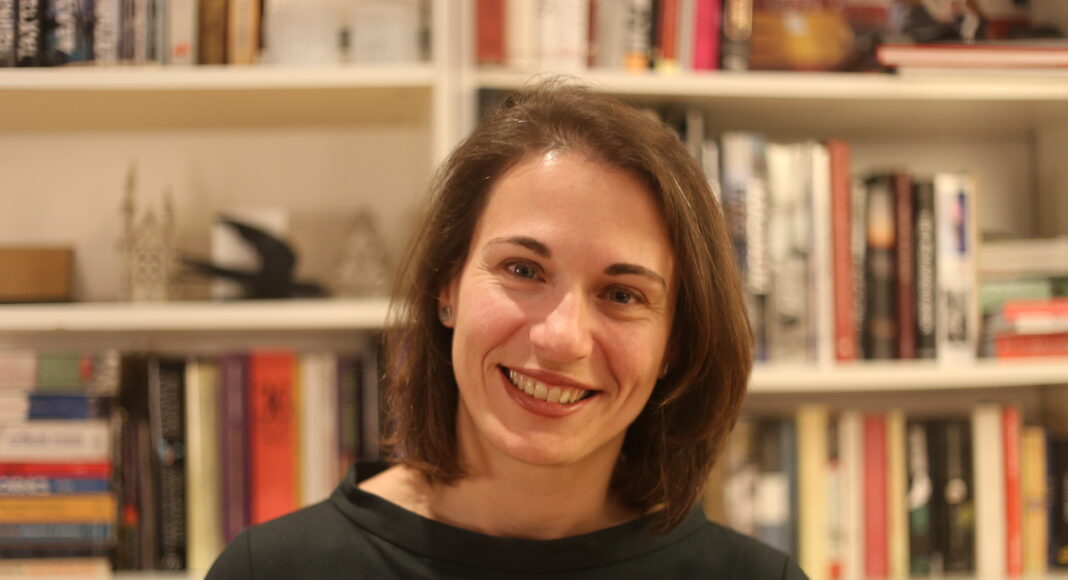A few months after her arrival in Australia and assuming her duties as Consul of Greece in Perth, Western Australia, Ms Karasiotou speaks exclusively to The Greek Herald about her impressions so far, the contribution of Greek diaspora in shaping the identity of modern Greece, but also the goals set in relation to the strengthening and promotion of the Greek language.
1. You came to Australia at the beginning of the year, just before the pandemic hit the country. Tell us about the situation in Western Australia and how it has affected the operation of the consulate?
The first period in a new country and in a new place is a period of adaptation and acclimatisation. Although fortunately I had some time during the first two months to make some appointments, attend events and meet people and things in Western Australia, this journey was abruptly interrupted, quite early, by the unprecedented situation we are experiencing.
The pandemic forced us to cancel all our events, with the first celebrations of March 25, while the planned visit of Deputy Foreign Minister Mr. Vlasis to Australia was postponed as you know, when the borders gradually began to close. The Consulate in Perth, like the rest of our Consulates in Australia and around the world, was closed to the public for about two months, while we had to assist in the safe return of our fellow citizens to Greece.
On a personal level, the constraints of the pandemic helped us to settle down faster in our new home and to spend more time with the children in the new environment. On the other hand, of course, my three-year-old son thought this was what life was like in Australia – closed playgrounds, shops and no social contact – and he wanted to go back!
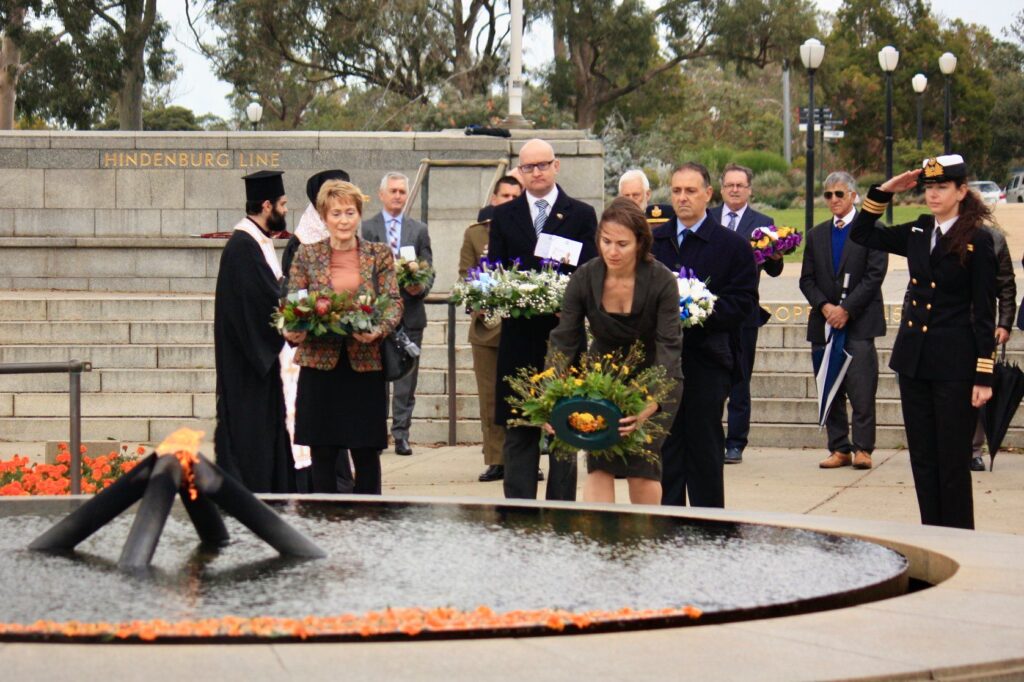
Fortunately, Western Australia has done very well in curbing the spread of the coronavirus, a fact that has allowed the phasing out since mid-May, even earlier than in other states. So we started serving the public again from the middle of May, while we organised, literally at the last minute, a small, modest and unofficial wreath-laying ceremony for the anniversary of the Battle of Crete and the Pontian Genocide, to which both Australian officials and representatives of the Greek community here responded positively (it should be noted that at that time there was a restriction of 20 people in public gatherings).
Since then, Western Australia is gradually returning to a new “normality,” during which the whole community is slowly returning to its normal activities.
RELATED: Perth commemorates 79th anniversary of the Battle of Crete in private ceremony.
2. Tell us about your career in the diplomatic service.
I passed the exams for the Diplomatic Service of the Greek Ministry of Foreign Affairs in 2007. After completing my training at the Diplomatic Academy, I served in Ministry Directorates in Athens until the spring of 2009, when I was transferred to Brussels to represent Greece in Europe. I spent five and a half very “full” years in Brussels from a professional point of view. My stay there coincided with the management of the Greek debt crisis, on the one hand, but also with the Greek Presidency of the Council of the EU, on the other. It was a period with a lot of work and minimal personal time, from which, however, I learned a lot.
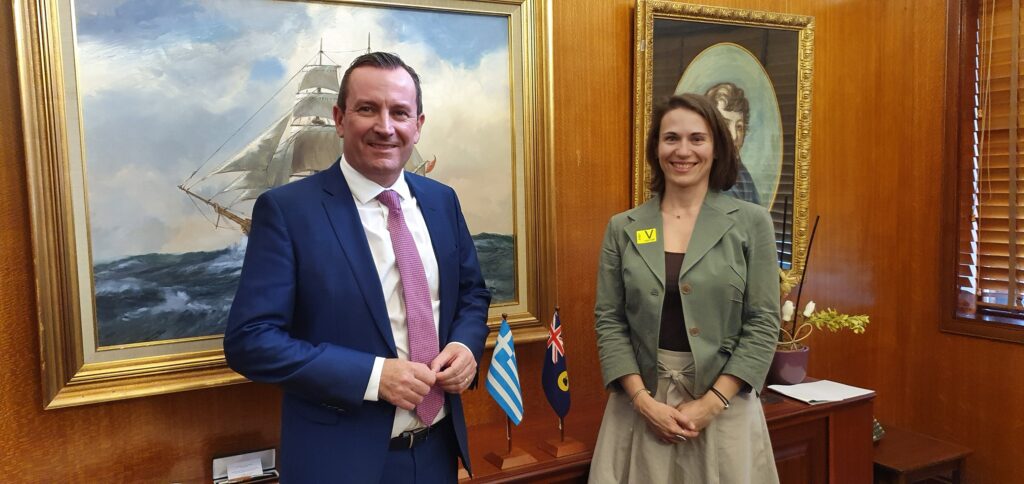
I returned to Athens in the autumn of 2014 and worked in various Directorates of the Central Office, including the Diplomatic Office of the Deputy Minister of European Affairs during the refugee crisis. In the meantime I took two personal “breaks” when I had my two children, during which we lived as a family in Rotterdam, the Netherlands, where my husband worked.
At the end of last year we all came together in Perth to take over the Consulate, which is a completely different professional object for me, but this is also the challenge and the beauty of our work.
3. Is this your first time in Australia? What do you think?
Yes, it is my first time and my impressions so far are very good. Australia is a country geographically very far from Europe but very close in mentality. It offers quality of life, especially for families, while it also has an impressive natural beauty. I look forward to exploring it as much as I can as soon as circumstances allow.
4. How do you see Hellenism here and what has impressed you?
The size of Australia’s Hellenism is impressive at first, despite the distance from Greece. As for Western Australia in particular, for which I am slowly forming the same opinion, the Greek community here, although smaller than those on the east side, is well integrated, networked and very active in the economic, political and cultural life of the state. and not only. During the first meetings I had with the Governor, the State Premier and other local actors, everyone spoke to me with the warmest words about the Greek community.
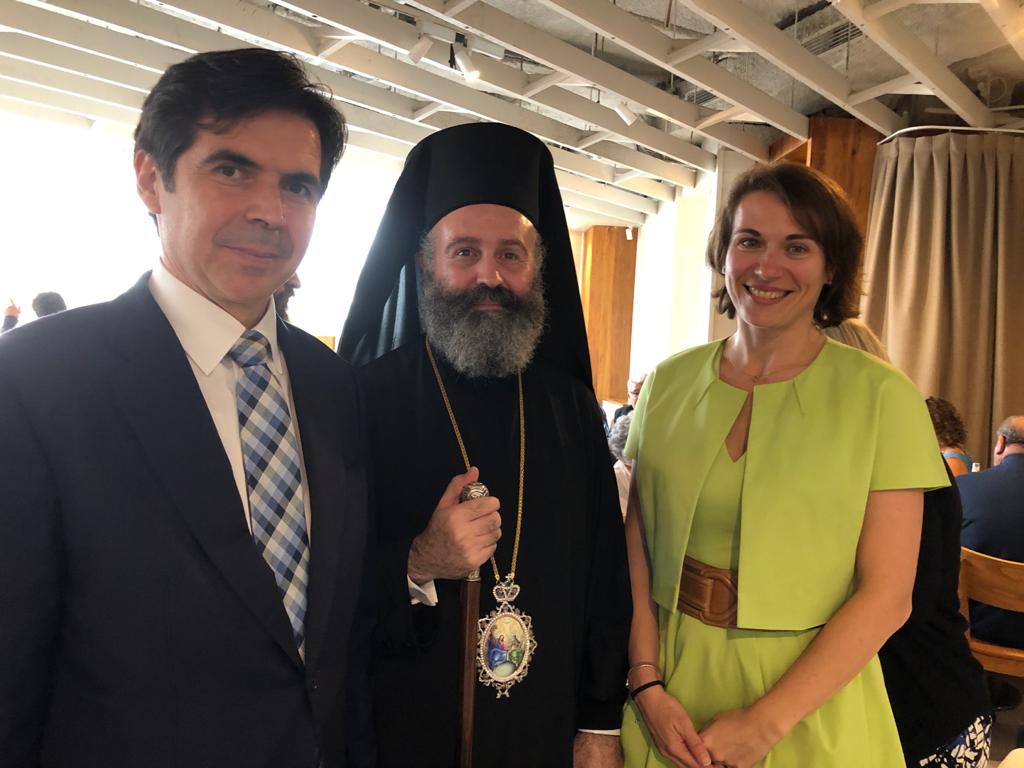
5. We hear that Greece has opened its borders to Australians. But Australians cannot go to Greece. Are there any diplomatic moves to reach a bilateral travel agreement in the near future?
The decision to gradually open our borders to tourists from third countries, including Australia, was taken jointly with our European Union partners, was well weighted and studied and is under constant review, depending on the epidemiological data. In this unprecedented situation we live in, every country does what it considers best to protect its public health and economy, and balancing the two is not always easy.
Greece and Australia participate in a group of seven countries, which have successfully managed the health crisis and the relevant communication takes place at the highest level, at the level of Prime Ministers. I am sure that when the conditions allow, the appropriate arrangements will be made in order to remove all obstacles to travel between the two countries.
6. What are your goals for your term in Australia?
Due to the pandemic that stopped our activity, I would say that I am still in the process of acclimatisation, at which time my goals are being formed. Certainly, of course, I have begun to form a picture of situations and needs, so I first realise that this side of Australia and its Hellenism are less known in Greece than Melbourne, Sydney, etc.
I would therefore like to contribute to the better acquaintance and increase of contacts between Greece and Western Australia, through economic, cultural, educational and other exchanges. The greater, also, promotion and strengthening of the Greek language, culture and modern Greece in Hellenism, mainly of the third and fourth generation, is a permanent goal and I hope to contribute to it as much as possible. Next year’s milestone of 200 years since the Greek Revolution is, I believe, a good opportunity in this direction.
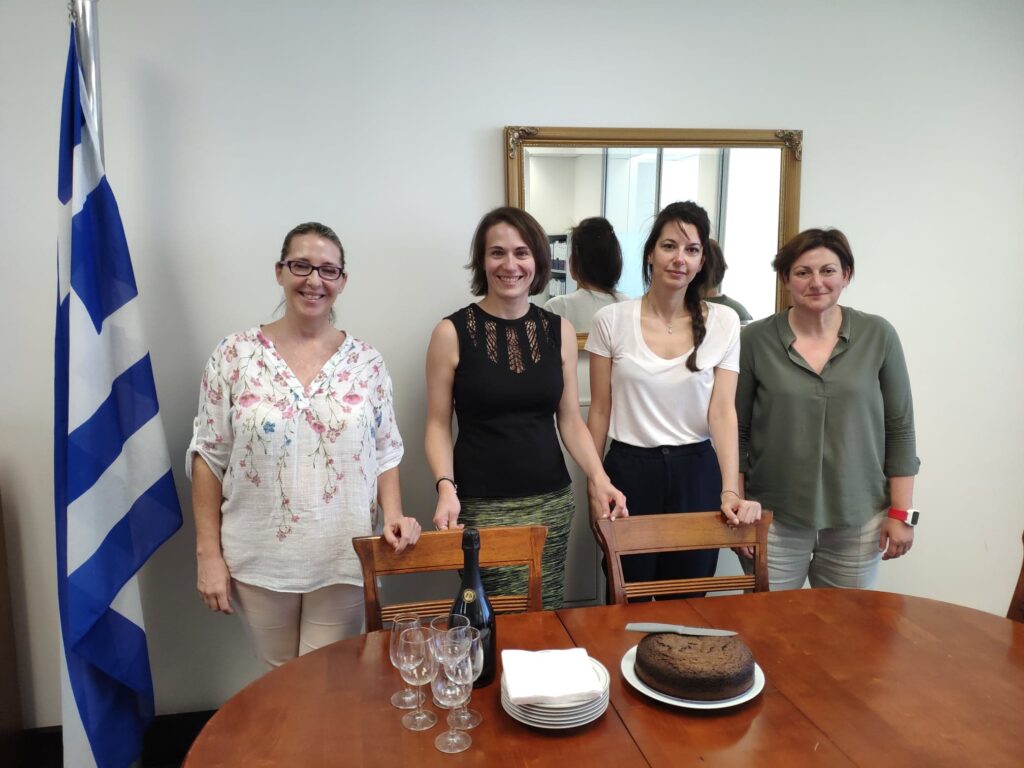
7. We are very close to 2021 and the 200th anniversary of the Greek War of Independence. What are you planning for this anniversary?
The health crisis, as it was inevitable, also affected the planning of the celebrations of the 200th anniversary of the Greek Revolution. Recently, the Deputy Foreign Minister, Mr Konstantinos Vlasis, together with the Chairman of the Committee “Greece 2021” Ms. Gianna Angelopoulou-Daskalaki sent a letter-invitation to Greeks around the world inviting them to participate in the celebrations. In this context, I met, during the previous period, with representatives of the Greek community of Western Australia and we exchanged some first thoughts and ideas for the time.
In addition to the usual celebrations organised by the Consulate each year, i.e. the reception and the laying of wreaths for the anniversary of March 25, there are expected to be festive anniversary events throughout the year. The aim is to have communication and consultation between all stakeholders, which could be facilitated by the establishment of a Steering Committee, so that the planned activities can be included and projected into a comprehensive Western Australia program. More specific steps will be taken in the near future.
8. What is your message to the Greeks of Australia?
Having lived for a long time outside of Greece, although in a different way, I know that no matter how far away we are, Greece is always in our hearts. Modern Greece owes its very existence to the Greeks of the Diaspora.
The Greeks of Australia, maintaining and preserving the love for the homeland, play a dual role: on the one hand, you feed with your experience from here the shaping of the modern face of our country and on the other hand, you promote and love the Greek element here, thus contributing to the deepening of Greek-Australian friendship.
We need you and we always want you near us. The Greek Consulate in Perth, like the rest of our Consulates in Australia, is always at your disposal for anything you need.

